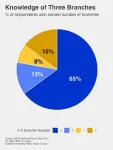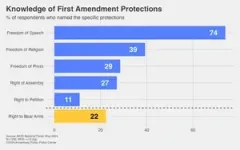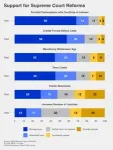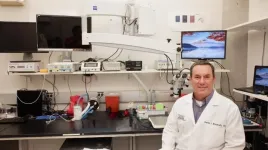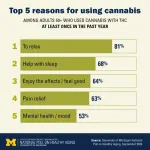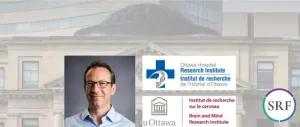(Press-News.org) Less than half of Americans can name most of the rights protected under the First Amendment and under two-thirds can name the three branches of government, according to the Annenberg Constitution Day Civics Survey, released annually since 2014.
The Annenberg Public Policy Center’s nationally representative survey, conducted in May 2024 with about 1,600 U.S. adults, finds levels of public knowledge largely unchanged from 2023. As was true last year, most Americans could name only a single right guaranteed by the First Amendment: freedom of speech, provided by nearly 3 in 4 respondents.
The survey also found strong public support for several potential reforms to the U.S. Supreme Court, including term limits, mandatory retirement ages, and prohibiting justices from participating in cases in which they have “personal or financial interests.”
Highlights
The 2024 edition of the Annenberg Constitution Day Civics Survey, released annually to celebrate Constitution Day on September 17, finds that:
Nearly two-thirds of Americans (65%) can name all three branches of government.
Asked what specific rights are guaranteed by the First Amendment, nearly three-quarters of respondents (74%) name freedom of speech. The other four rights are recalled by far fewer people: the second most-often cited, freedom of religion, is named by just 39%.
Over 80% of Americans support prohibiting Supreme Court justices from participating in cases in which they have “personal or financial interests.” Nearly as many people support creation of a formal ethics code for the court.
A little over half of U.S. adults know that Democrats control the Senate (55%) and that Republicans control the House of Representatives (56%).
“Civics knowledge matters,” says Kathleen Hall Jamieson, director of the Annenberg Public Policy Center. “Those who do not understand the rights protected by the Constitution can neither cherish nor invoke them; those who do not know which party controls the House and Senate may misattribute credit or blame for action or inaction.”
The Annenberg Constitution Day Civics Survey is a nationally representative survey conducted by the Annenberg Public Policy Center (APPC) of the University of Pennsylvania. This year’s online survey of 1,590 U.S. adults was conducted May 1-23, 2024, for APPC by SSRS, an independent research company. The margin of error is ± 3.3 percentage points at the 95% confidence level. For more information, see the full release and topline.
The branches of government and the First Amendment
The three branches: Nearly two-thirds of Americans (65%) can name all three branches of government, 13% can name two, 8% can name one, and 15% cannot name any, unchanged from last year.
The First Amendment: Respondents were asked if they could name the specific rights guaranteed under the First Amendment:
Three-quarters (74%) say freedom of speech
Under 4 in 10 (39%) say freedom of religion
Less than a third (29%) say freedom of the press
Over a quarter (27%) say the right to assembly
About 1 in 10 (11%) say the right to petition the government
Less than a third of respondents (30%) can name a majority of rights (three or more). Only 7% of respondents can name all five First Amendment rights, while 23% can name three or four, and about half (48%) can name one or two. About 1 in 5 people (21%) cannot name any.
Although 11% correctly say the right to petition the government, twice as many people (22%) incorrectly name the right to bear arms, which instead is protected by the Second Amendment.
Support for Supreme Court reforms
In recent years, surveys have shown declining trust and confidence in the U.S. Supreme Court. The Annenberg Public Policy Center’s Constitution Day Survey has found that from 2019 to 2022, confidence in the Supreme Court plunged 22 percentage points, from 68% to 46%. With this changing environment as a backdrop, the 2024 survey asked respondents about measures that have been discussed to reform the Supreme Court:
Prohibiting participation of justices with conflicts: 82% support prohibiting justices from participating in cases in which they have personal or financial interests.
Formal ethics code: 77% support creation of a formal ethics code for Supreme Court justices that allows for justices to be investigated if they are accused of an ethical violation.
Mandatory retirement age: 69% support requiring justices to retire by a certain age.
Term limits: 68% support setting a specific number of years for justices to serve instead of granting them lifetime appointments.
Public referenda: 47% support allowing the public to vote to overturn Supreme Court decisions on controversial issues.
Increasing the size of the court: 29% support increasing the number of justices on the current nine-member Supreme Court.
For findings on support for Supreme Court reform by political party and civics knowledge, see the full release.
Constitution Day
APPC releases the Annenberg Civics Knowledge Survey for Constitution Day, which celebrates the signing of the Constitution on Sept. 17, 1787. APPC’s initiatives to enhance civics education include Annenberg Classroom, which offers free resources for teaching the Constitution, and the Civics Renewal Network, a coalition of 43 nonpartisan, nonprofit organizations dedicated to improving civics education by providing free, high-quality resources for teachers. Among those resources: CRN’s Constitution Day Toolkit for teachers and an Annenberg Classroom series of award-winning videos, including the new “The Eighth Amendment: Cruel and Unusual Punishment.”
The Annenberg Public Policy Center was established in 1993 to educate the public and policy makers about communication’s role in advancing public understanding of political, science, and health issues at the local, state, and federal levels.
END
A majority of Americans can’t recall most First Amendment rights
Strong support seen for Supreme Court reforms in Annenberg survey
2024-09-12
ELSE PRESS RELEASES FROM THIS DATE:
2024 Blavatnik National Awards for Young Scientists announced
2024-09-12
NEW YORK, September 12, 2024 – For the second time, the Blavatnik Family Foundation and The New York Academy of Sciences named three women scientists as Laureates of the Blavatnik National Awards for Young Scientists. Each will receive $250,000, the largest unrestricted scientific prize offered to America’s most promising, faculty-level scientific researchers under 42. Three independent juries – one each for life sciences, chemical sciences, and physical sciences & engineering – composed of some of America’s most distinguished scientists selected the three winning Laureates. An additional 15 Finalists will each receive ...
TTUHSC’s Jerry H. Hodge School of Pharmacy establishes Brain Drug Discovery Center
2024-09-12
After more than a decade of research growth and recruiting efforts to build strong, collaborative research programs, the Jerry H. Hodge School of Pharmacy in Amarillo has developed the Brain Drug Discovery Center, the newest Texas Tech University Health Sciences Center (TTUHSC) research center.
Created from two existing pharmacy school centers — the Center for Blood-Brain Barrier Research and the Cancer Biology Research Center — the Brain Drug Discovery Center will focus on ...
Collaborative three-campus QB3 research team awarded $12 million CIRM grant to study origins of autism in diverse population
2024-09-12
A QB3-led team uniting researchers from the University of California campuses at Berkeley, San Francisco, and Santa Cruz was awarded a $12 million grant from the California Institute for Regenerative Medicine (CIRM) to investigate the origins of autism using sophisticated cellular models called “neural organoids.”
This grant is the first funding brought in by QB3’s Collaborative Research initiative, which was recently created to address major challenges in human health by leveraging research talent and resources across the UC campuses served by QB3.
"We are grateful for the support provided by the CIRM team to craft a highly successful application ...
Cannabis and older adults: Poll shows current use patterns, beliefs and risks
2024-09-12
Whether they’re using it for recreational or medical reasons, a sizable percentage of people in their 50s and older have smoked, eaten, drunk or applied to their skin at least one form of cannabis in the past year, a new poll shows.
In all, 21% of people age 50 and older said they used a form of cannabis that contains the psychoactive compound THC at least once in the past year, according to new findings from the University of Michigan National Poll on Healthy Aging. The poll report focuses on use of cannabis ...
Dr. Baptiste Lacoste, of the Ottawa Hospital Research Institute and uOttawa Brain and Mind Research Institute, receives a SynGAP Research Fund (SRF) Grant for Groundbreaking Research on Vascular and M
2024-09-12
Mill Valley, CA – September 12, 2024 – The SynGAP Research Fund 501(c)(3) announces a $128,888 grant to Dr. Baptiste Lacoste at the uOttawa Brain and Mind Research Institute (uOBMRI) and Ottawa Hospital Research Institute (OHRI). This grant supports Dr. Lacoste's pioneering research project aimed at exploring the role of vascular and metabolic dysfunction in SYNGAP1-Related Non-Syndromic Intellectual Disability (SYNGAP1-NSID), also known as SYNGAP1-Related Disorders (SRD).
With elevated energy demands and a limited capacity to store ...
$75,000 prize inspired by 18th century Scots economist attracts global entries
2024-09-12
A Scottish $75,000 prize for “radical innovation” has shortlisted four academics from around the world.
Named after Panmure House, the former Edinburgh home of 18th century Scots economist and philosopher Adam Smith, the Panmure House Prize rewards groundbreaking research that contributes to advancing long-term thinking and innovation.
After a record number of entries for the 2024 prize, its fourth year, the judges have drawn up a shortlist of four submissions from the United States, Spain ...
SOPHiA GENETICS announces poster presentations at ESMO 2024
2024-09-12
Boston, MA and Rolle, Switzerland, September 12, 2024 – SOPHiA GENETICS (Nasdaq: SOPH), a cloud-native healthcare technology company and a global leader in data-driven medicine, will be presenting multiple posters at the European Society for Medical Oncology (ESMO) Congress 2024 being held in Barcelona, Spain September 13-17, 2024. The ESMO Congress is a globally influential oncology platform for clinicians, researchers, patient advocates, journalists and healthcare industry representatives from all over the world.
The details of the presentations are as follows:
Title: ...
New fossil fish species scales up evidence of Earth’s evolutionary march
2024-09-12
Access VIDEO, photos and captions here
Climate change and asteroids are linked with animal origin and extinction – and plate tectonics also seems to play a key evolutionary role, ‘groundbreaking’ new fossil research reveals.
The discovery of an exceptionally well preserved ancient primitive Devonian coelacanth fish in remote Western Australia has been linked to a period of heightened tectonic activity, or movement in the Earth’s crust, according ...
Personal carbon footprint of the rich is vastly underestimated by rich and poor alike, study finds
2024-09-12
The personal carbon footprint of the richest people in society is grossly underestimated, both by the rich themselves and by those on middle and lower incomes, no matter which country they come from. At the same time, both the rich and the poor drastically overestimate the carbon footprint of the poorest people.
An international group of researchers, led by the Copenhagen Business School, the University of Basel and the University of Cambridge, surveyed 4,000 people from Denmark, India, Nigeria and the United States about inequality in personal carbon footprints – the total amount of greenhouse gases ...
Tumor-induced B cell changes reveal potential biomarker for treatment response in triple negative breast cancer
2024-09-12
HOUSTON – (Sept. 12, 2024) – Researchers at Baylor College of Medicine and collaborating institutions have discovered new insights into tumor-induced B cell changes in blood and bone marrow of triple negative breast cancer patients. The findings, published in Nature Cell Biology, show two distinct patterns of B cell abnormalities that could serve as blood biomarkers for determining likelihood of response to standard-of-care chemotherapy and immunotherapy.
“Even with significant advances in immunotherapy, ...
LAST 30 PRESS RELEASES:
Stress-testing the Cascadia Subduction Zone reveals variability that could impact how earthquakes spread
We may be underestimating the true carbon cost of northern wildfires
Blood test predicts which bladder cancer patients may safely skip surgery
Kennesaw State's Vijay Anand honored as National Academy of Inventors Senior Member
Recovery from whaling reveals the role of age in Humpback reproduction
Can the canny tick help prevent disease like MS and cancer?
Newcomer children show lower rates of emergency department use for non‑urgent conditions, study finds
Cognitive and neuropsychiatric function in former American football players
From trash to climate tech: rubber gloves find new life as carbon capturers materials
A step towards needed treatments for hantaviruses in new molecular map
Boys are more motivated, while girls are more compassionate?
Study identifies opposing roles for IL6 and IL6R in long-term mortality
AI accurately spots medical disorder from privacy-conscious hand images
Transient Pauli blocking for broadband ultrafast optical switching
Political polarization can spur CO2 emissions, stymie climate action
Researchers develop new strategy for improving inverted perovskite solar cells
Yes! The role of YAP and CTGF as potential therapeutic targets for preventing severe liver disease
Pancreatic cancer may begin hiding from the immune system earlier than we thought
Robotic wing inspired by nature delivers leap in underwater stability
A clinical reveals that aniridia causes a progressive loss of corneal sensitivity
Fossil amber reveals the secret lives of Cretaceous ants
Predicting extreme rainfall through novel spatial modeling
The Lancet: First-ever in-utero stem cell therapy for fetal spina bifida repair is safe, study finds
Nanoplastics can interact with Salmonella to affect food safety, study shows
Eric Moore, M.D., elected to Mayo Clinic Board of Trustees
NYU named “research powerhouse” in new analysis
New polymer materials may offer breakthrough solution for hard-to-remove PFAS in water
Biochar can either curb or boost greenhouse gas emissions depending on soil conditions, new study finds
Nanobiochar emerges as a next generation solution for cleaner water, healthier soils, and resilient ecosystems
Study finds more parents saying ‘No’ to vitamin K, putting babies’ brains at risk
[Press-News.org] A majority of Americans can’t recall most First Amendment rightsStrong support seen for Supreme Court reforms in Annenberg survey
